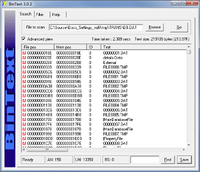-
New Windows worm spreading by exploiting weak passwords

A new Windows worm is spreading through company networks by exploiting weak passwords; the worm, dubbed “Morto” spreads using RDP, or Remote Desktop Protocol, the Microsoft-made protocol for controlling one computer by connecting to it from another
-
-
Chinese TV shows cyber-attack software
A Chinese government TV station, perhaps inadvertently, shows a government cyberattack aimed at Falun Gong computers; the video identifies the software as being written by the Electrical Engineering University of the People’s Liberation Army; the video — which has been removed from the TV station’s Web site — provides direct evidence of Chinese government involvement in cyberattacks
-
-
Penn State offers online minor in homeland security
Penn State is the latest to join the handful of educational institutes offering a minor in homeland security; the degree is available online and is designed to provide students with the skills needed to enter the homeland security field
-
-
TSA Blackberries vulnerable

The Transportation Security Administration’s (TSA) Blackberry mobile devices are vulnerable to cybersecurity threats due to a backlog of security patches and their configurations; with these vulnerabilities, hackers could exploit unsecured wireless networks to monitor data transmissions, execute denial of service attacks, alter messages, or even impersonate legitimate users to steal sensitive data provided by airline passengers
-
-
Rampant insider hacking at U.S. immigration agency

A yearlong investigation by the DHS Inspector General has revealed multiple instances of insider hacking at U.S. Citizenship and Immigration Services (USCIS); the inspector general found that employees had accessed management-level email and other confidential files
-
-
Cyber experts dispute McAfee's Shady RAT report

Earlier this month, cybersecurity experts discovered a five-year operation that infiltrated U.S. government and UN computer networks; China is believed to be the culprit behind the systematic attacks, dubbed “Operation Shady RAT,” which also hit major defense contractors and private businesses; many within the cybersecurity community are disputing the significance of the finding
-
-
Japanese pharmaceutical crippled by insider cyberattack
Last week a disgruntled former contract employee pleaded guilty for severely disrupting the networks of Shionogi, a Japanese pharmaceutical firm; the attacks were so severe that they crippled Shionogi’s operations for “a number of days, leaving employees unable to ship products, to cut checks or even communicate via email,” according to court documents
-
-
Hong Kong arrests stock exchange hacker
Last Friday authorities in Hong Kong announced that they had arrested a man for hacking into the city’s stock exchange and disrupting the trades of seven companies; two weeks ago the Hong Kong stock exchange’s website was hit with a malicious attack that caused several firms including global banking giant HSBC and the international airline Cathay Pacific to suspend trading for half a day
-
-
Anonymous retaliates against BART
The hacking collective Anonymous released personal data on Sunday belonging to more than 2,000 public transport customers in the San Francisco area in retaliation for the Bay Area Rapid Transit (BART) system’s shutdown of mobile phone service on Thursday night
-
-
ManTech wades into private cybersecurity market
In an increasing trend, more traditional defense contractors are seeking to expand their businesses by entering the burgeoning field of cybersecurity for commercial companies; after disposing of its private sector cybersecurity business in 2002, ManTech International is seeking to enter the market once more
-
-
Attackers have advantage in cyberspace, says cybersecurity expert

Homeland Security NewsWire’s executive editor Eugene Chow recently caught up with Bruce Schneier, a cybersecurity expert and the author of several bestselling books, including “Applied Cryptography,” “Secrets and Lies,” and “Beyond Fear”; in the interview Schneier discusses the recent politically motivated cyberattacks by Anonymous and AntiSec, securing U.S. networks against counterfeit computer chips, and President Obama’s proposed cybersecurity plan
-
-
Anonymous hacker collective hits rural law enforcement

In its latest exploit, global hacker collective Anonymous claimed to release ten GB of stolen data from more than seventy rural sheriff’s departments across the United States, leaking sensitive information that could compromise the agencies’ investigations
-
-
Cost of cyberattacks on the rise
A new study shows that cybercrime is costing corporations 56 percent more than last year; the study conducted by the Ponemon Institute and sponsored by ArcSight, an HP company, found that the median cost of cybercrimes for the fifty companies surveyed was $5.9 million; the increase in costs were largely due to hackers using stealthier techniques
-
-
Microsoft offers $250,000 in cybersecurity competition
Last Wednesday at the annual Black Hat and Defcon convention for hackers, Microsoft announced a competition for cyber security specialists in which it would award $200,000 to the individual who develops the most innovative computer protection technology
-
-
DHS officials: Stuxnet can morph into new threat
Government cybersecurity experts warn that the Stuxnet virus, which damaged Iran’s nuclear centrifuges, could morph into something even more destructive; DHS officials worry that hackers could design more complex versions of the virus that can evade detection and bypass existing software fixes
-
- All
- Regional
- Water
- Biometrics
- Borders/Immig
- Business
- Cybersecurity
- Detection
- Disasters
- Government
- Infrastructure
- International
- Public health
- Public Safety
- Communication interoperabillity
- Emergency services
- Emergency medical services
- Fire
- First response
- IEDs
- Law Enforcement
- Law Enforcement Technology
- Military technology
- Nonlethal weapons
- Nuclear weapons
- Personal protection equipment
- Police
- Notification /alert systems
- Situational awareness
- Weapons systems
- Sci-Tech
- Sector Reports
- Surveillance
- Transportation
Advertising & Marketing: advertise@newswirepubs.com
Editorial: editor@newswirepubs.com
General: info@newswirepubs.com
2010-2011 © News Wire Publications, LLC News Wire Publications, LLC
220 Old Country Road | Suite 200 | Mineola | New York | 11501
Permissions and Policies
Editorial: editor@newswirepubs.com
General: info@newswirepubs.com
2010-2011 © News Wire Publications, LLC News Wire Publications, LLC
220 Old Country Road | Suite 200 | Mineola | New York | 11501
Permissions and Policies
